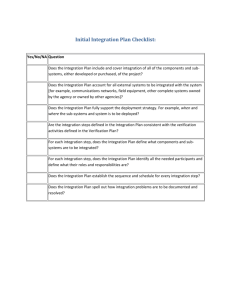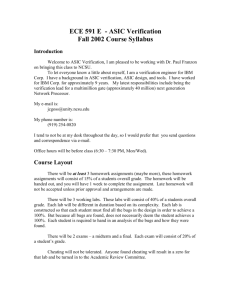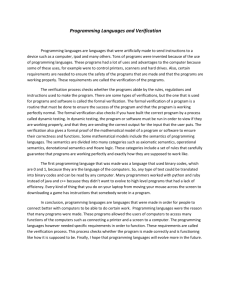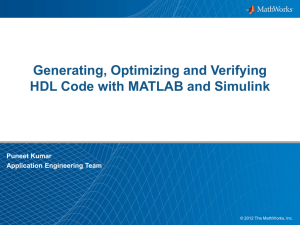Document 8522390
advertisement
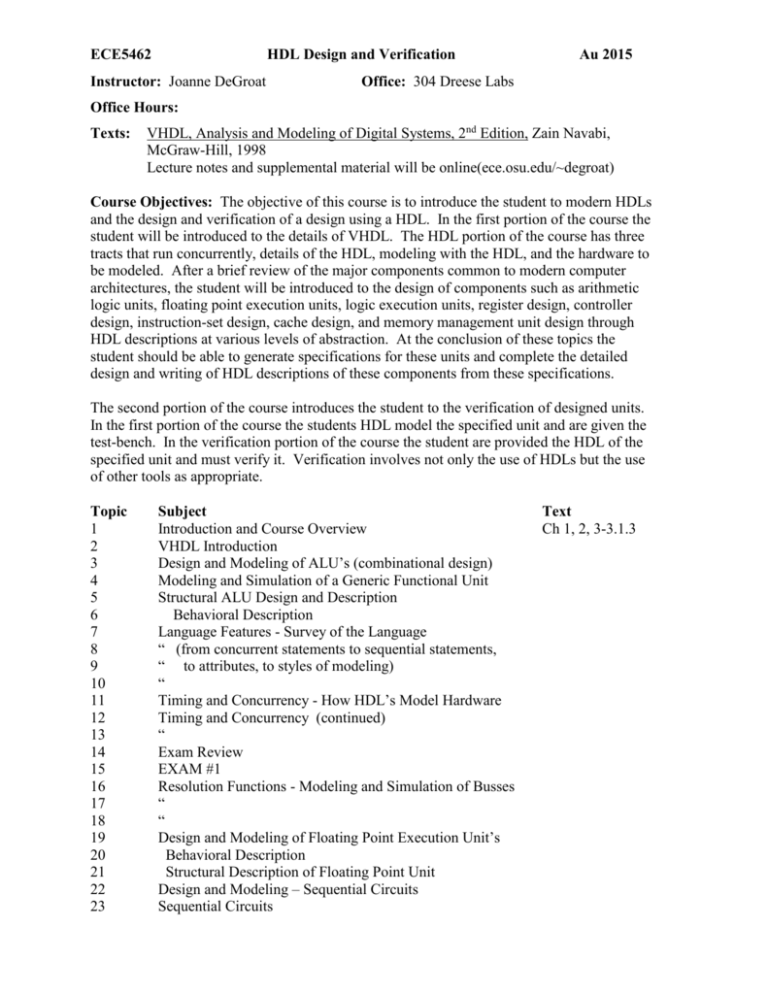
ECE5462 HDL Design and Verification Instructor: Joanne DeGroat Au 2015 Office: 304 Dreese Labs Office Hours: Texts: VHDL, Analysis and Modeling of Digital Systems, 2nd Edition, Zain Navabi, McGraw-Hill, 1998 Lecture notes and supplemental material will be online(ece.osu.edu/~degroat) Course Objectives: The objective of this course is to introduce the student to modern HDLs and the design and verification of a design using a HDL. In the first portion of the course the student will be introduced to the details of VHDL. The HDL portion of the course has three tracts that run concurrently, details of the HDL, modeling with the HDL, and the hardware to be modeled. After a brief review of the major components common to modern computer architectures, the student will be introduced to the design of components such as arithmetic logic units, floating point execution units, logic execution units, register design, controller design, instruction-set design, cache design, and memory management unit design through HDL descriptions at various levels of abstraction. At the conclusion of these topics the student should be able to generate specifications for these units and complete the detailed design and writing of HDL descriptions of these components from these specifications. The second portion of the course introduces the student to the verification of designed units. In the first portion of the course the students HDL model the specified unit and are given the test-bench. In the verification portion of the course the student are provided the HDL of the specified unit and must verify it. Verification involves not only the use of HDLs but the use of other tools as appropriate. Topic 1 2 3 4 5 6 7 8 9 10 11 12 13 14 15 16 17 18 19 20 21 22 23 Subject Introduction and Course Overview VHDL Introduction Design and Modeling of ALU’s (combinational design) Modeling and Simulation of a Generic Functional Unit Structural ALU Design and Description Behavioral Description Language Features - Survey of the Language “ (from concurrent statements to sequential statements, “ to attributes, to styles of modeling) “ Timing and Concurrency - How HDL’s Model Hardware Timing and Concurrency (continued) “ Exam Review EXAM #1 Resolution Functions - Modeling and Simulation of Busses “ “ Design and Modeling of Floating Point Execution Unit’s Behavioral Description Structural Description of Floating Point Unit Design and Modeling – Sequential Circuits Sequential Circuits Text Ch 1, 2, 3-3.1.3 ECE5462 24 25 26 27 28 29 30 31 32 33 34 35 36 37 38 39 40 HDL Design and Verification Au 2015 Introduction to the Verilog HDL Verilog Continued Exam 2 Review EXAM 2 Introduction to verification, verification approaches The first verification assignment Direct Random Tests Verification Plans and levels of verification Verification Tools Simulation engines Verification Strategies The second verification assignment Stimulus and response Self-checking testbenches Architecting Testbenches and Simulation management Student Presentations of Verification Projects “ Grading Policy HDL Exam(s) Verification Reports (15% each) Verification Oral Report Homework and Computer Assignments 20% 30% 10% 40% IF YOU DO NOT GET AT LEAST A PASSING GRADE IN EACH OF THE 3 COMPONENTS (ON THE EXAMS, REPORTS OR THE HOMEWORK AND THE COMPUTER ASSIGNMENTS) YOU CANNOT PASS THE COURSE. ADDITIONALLY YOU MUST GET AT LEAST A 40% ON EACH COMPUTER ASSIGNMENTS OR YOUR GRADE COULD BE AFFECTED. Reference Texts: Writing Testbenches, Functional Verification of HDL Models, 2nd Edition, Janik Bergeron, Springer 2003. The Art of Verification with VERA, Faisal I. Haque, Khizar A. Karhn, Jonathan Michelson, Verification Centrla, 2001. VHDL, by Douglas L. Perry, McGraw Hill, 1991 A VHDL Primer, by Jayaram Bhasker, Prentice Hall, 1992 IEEE Standard 1076-1987, VHSIC Hardware Description Language, IEEE Press, 1987 IEEE Standard 1076-1997, VHSIC Hardware Description Language, IEEE Press, 1997 IEEE Standard 1076-2008 VHSIC Hardware Description Language, IEEE Press, 2008. ECE5462 HDL Design and Verification Au 2015 Computer Architecture, A Quantitative Approach, by John L. Hennessy and David A. Patterson, Morgan Kaufmann, 1990 Digital Systems, Hardware Organization and Design, 3rd Edition, by Fredrick J. Hill and Gerald R. Peterson, John Wiley, 1987. General Policies for this course: 1) Discussing homework and guided project step solutions with other students is allowed, however, the work you turn in must be yours! Electronic exchange of HDL code is specifically prohibited, as is the use of the code of any student who has previously taken the course, i.e., just do not do it!!!! Homework/Project assignments are under constant modification so a previous coding may or may not work. 2) Homework and project step solutions must be turned in on time electronically using CARMEN. Late submissions will be accepted on a case by case basis. Work submitted late will be subject to a late submission penalty of 2 points per day to a maximum of 50%. Homework and project step assignments will posted on the web. Assignment are typically due 2 classes after they are handed out (or assigned), i.e., handed out on Monday - due Friday, handed out on Wednesday - due the following Monday, and handed out on Friday due the following Wednesday. Course web page: Can be accessed through ece.osu.edu/~degroat and using the 762 class link. 3) Illness and extenuating circumstances are handled on a case by case basis. Notify me as soon as possible. (Assignments will be submitted online to the correct dropbox on the CARMEN course page.)
